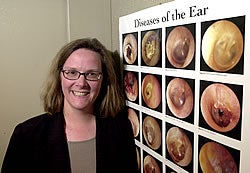ECU faculty member awarded $1.4 million NIH grant to study dizziness, imbalance
An East Carolina University associate professor has been awarded a five-year, $1.4 million research grant from the National Institutes of Health to continue her study into the role genes may play in dizziness and imbalance, known as vestibular disorders.
Dr. Sherri Jones, associate professor in the Department of Communication Sciences and Disorders in the School of Allied Health Sciences, is principal investigator of the grant project. It is an extension of an NIH grant that Jones brought to ECU when she joined the faculty in July 2003. Her research has focused on vestibular deficits in mice, whose genes and inner ear are very similar to humans.

Dr. Sherri Jones, associate professor in the Department of Communication Sciences and Disorders in the School of Allied Health Sciences, is trying to determine if there is a genetic reason for some balance impairments.
The prestigious NIH grant from the National Institute of Deafness and Other Communication Disorders will expand Jones’ research by studying additional mouse strains and by adding anatomy and genetic components to her work.
The first grant enabled Jones and co-investigators around the country to screen various mice functions such as behavior, hearing, brain-wave activity and vestibular function. Researchers identified specific mouse strains that showed deficits. The current grant will allow Jones and her collaborators to look specifically at the strains that they identified with the first study and to characterize the dysfunction in detail, identify the structural deficit in the inner ear and identify the potential location on the chromosome contributing to gravity receptor dysfunction, Jones said.
Of particular interest is identifying mouse strains that have imbalance but normal hearing and identifying those that don’t have imbalance but poor hearing to profound deafness.
“Our studies suggest that there may be some unique genes for that to happen,” Jones said. “If it’s a gene, I want to find it.”
Since the mid-1990s, a vast amount of research has been done on genetic hearing impairment. Fifty to 60 percent of all hearing loss in children is thought to have a genetic cause. Genetics also plays a role in children who are born deaf, Jones said. “While we’ve had a lot of research in genetic hearing impairment, there’s been very little research in genetic vestibular impairment and that’s where my project is trying to focus.”
Jones is trying to determine if there is a genetic reason for some balance impairments. A significant number of people with hearing problems also have imbalance or dizziness.
The results of the study are potentially applicable to the entire lifespan of an individual, because imbalance and dizziness can afflict both young and old, Jones said. Mice are excellent models for the study of human disease because of their similar gene makeup and short lifespan. Mice live about two years, allowing scientists to collect a lot of data from birth to death in a short amount of time. “I believe my research could lead to important diagnostic and potential treatments for balance dysfunction,” said Jones, a licensed audiologist. “We need more basic research that can lead to more clinical research and a better understanding of the causes of the disorder, which can lead to eventual treatment.”